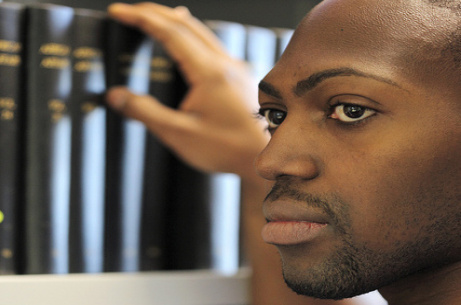
Kevin Beckford is studying hip hop culture in an East African context.
From its roots in the US urban scene, hip hop has been widely adopted the world over, but in the process it has been adapted and made relevant to particular youth groups.
In East Africa that has meant hip hop artists using it as a vehicle for expressing their thoughts on everything from colonialism to HIV and public health, says Kevin Beckford [2011], who is doing an MPhil in African Studies with the support of a Gates Cambridge scholarship.
Not all of the artists are overtly political either, he says. Kevin’s interest in East African hip hop was galvanised by an internship with the Ugandan parliament during his undergraduate years at Yale. He completed his senior undergraduate thesis was on Pan Africanism and hip hop, studying how US and East African artists use music to bridge cultural gaps and bring about understanding within the African diaspora.
At Cambridge he is continuing to look at hip hop culture especially in an East African context. “I am interested in how young people engage with hip hop to express and style themselves and in its political claims,” he says.
He finds one of the most striking things about hip hop that it is not about one side dictating to or emulating the other. “It’s not just copying. US hip hop can inspire, but people in East Africa are creating their own brand of hip hop,” he says. The topics they rap about, for instance, are different. In East Africa, they might be rapping about colonialism, the situation of post-colonial countries, HIV and public health. “They rap about what is relevant in their lives,” he says.
He adds that there is quite a lot of scholarship on hip hop in East Africa, but most of it is about politically charged rapping in Tanzania which is often led by youth activists. “I argue that hip hop in East Africa is a bit more nuanced,” says Kevin. “Some popular artists are very political, but in a different way. They might have a catchy song and rap in Kiswahili, for instance, picking up a particular theme.”
Kevin’s own background has had a big impact on his academic career. Born and raised in New Jersey, his parents were first generation Jamaicans. He was raised by his grandmother who was a care assistant who worked with women with mental and physical health problems.
He credits his grandmother with instilling a passion for learning in him. “She always stressed the importance of education,” he says. “She had to stop school very early on to work so she believed very strongly in the value of education. She expected that I should get As and nothing less. I spent a lot of my childhood in the library.”
Kevin’s aunt was also a huge influence. She taught him to read before he started school. “We would spend summer nights on the veranda reading under the stars,” he says.
At school he was mainly interested in social studies and history, particularly in topics that connected to his own personal experiences and those of the people from his neighbourhood. He was usually the only African American male student in his gifted and talented classes. “At times I felt like an outcast and different from the others, although there were good times too,” he says.
From an early age he was very academically ambitious and planned to go to one of the top universities. In middle school he learnt that these universities had very generous financial aid packages. “Knowing that made it seem an achievable aim,” he says.
He won several scholarships in the end and took up a generous financial package from Yale to study African American Studies and political science. “I wanted to combine my life experience and my passion and I had a desire to give something back to my community,” he says. At Yale he had total freedom to attend a huge variety of humanities classes. When he was coming up to graduation he looked at scholarship programmes which would allow him to continue his studies and to focus more on African hip hop. He was impressed by the University of Cambridge’s African Studies Centre and when he heard about the Gates Cambridge scholarship he applied.
Kevin hopes eventually to teach high school students and to make the history curriculum more inclusive. “I feel very blessed about the opportunities that have been given to me,” he says. “I think I could use my experiences to give something back. Many people in my community helped me get to where I am.”
He adds: “I am very interested in the way history is taught. History is very subjective. I want to look at how it is taught to children and how lots of people’s experiences are not covered in the curriculum. I want to teach a history that is more inclusive of the experiences of everyone.”
Photo credit: Sir Cam.












